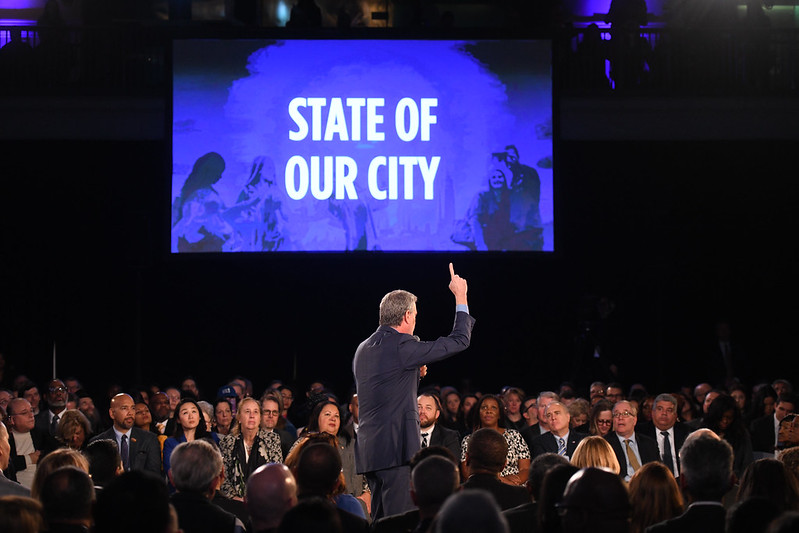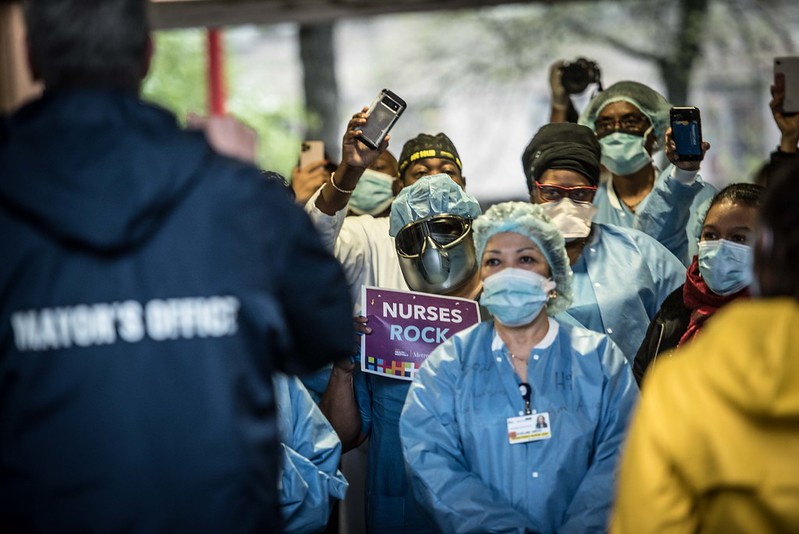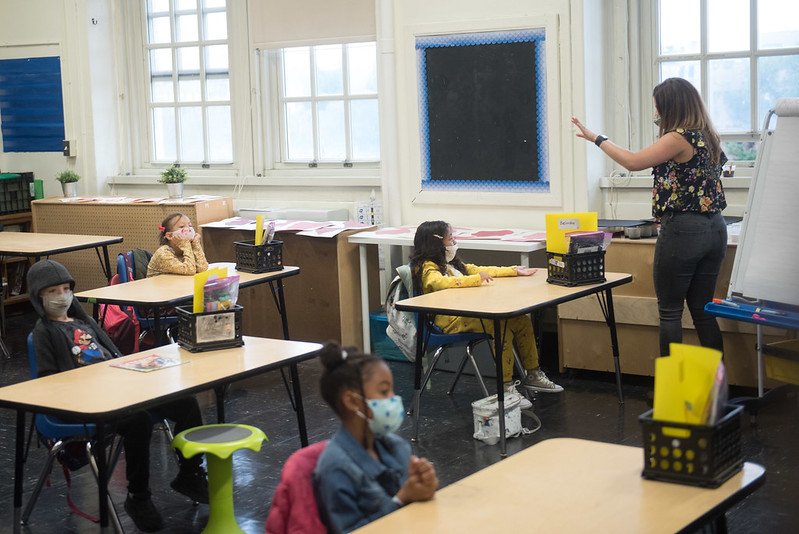Advice for the Next Mayor from a Veteran of the City Hall Trenches

State of the City 2020 (photo: Michael Appleton/Mayoral Photography Office)
New York City is at a crossroads. As our response cautiously shifts to recovery, we will have an equally important responsibility to reimagine the promise of the greatest city in the world. While Bill de Blasio has a year to jumpstart that progress, it will largely fall to the next mayor to make it happen.
I helped grind the gears of City Hall for three years under this administration. I saw a lot that worked and a lot that didn’t. With the 2021 mayoral race quickly taking shape, here’s the advice I would give whoever is elected to write one of the most important chapters in our city’s history.
Have a strong chin. Nobody escapes City Hall unbloodied. The legacies of Koch, Dinkins, Giuliani, and Bloomberg needed heavy polishing in the years after they left. De Blasio’s will, too. The second hardest job in American politics is not for people who need to be loved. Being mayor is a service-delivery job and people are never satisfied with their service. Test scores go up and crime goes down because of teachers and cops. Schools lag and crime climbs because of you. This is it for your political career, so smile and do the right thing.
Think big. One in five New Yorkers is out of work. Safety, tourism, transit, and tax revenue feel less reliable than they have in two decades. We can’t count on Albany or Washington for help. Incrementalism will not restart our economy and pragmatism alone will not restore faith in our city’s future. We need a big thinker capable of reimagining some foundational elements of our city’s physical and economic landscape to meet this moment. If you’re not ruffling some feathers, you are not thinking big enough.
Be strong and sometimes wrong. Politicians in search of perfect triangulations that make everyone happy fail in New York City. So do those toiling to perfect bulletproof fixes to intractable problems. New Yorkers, and our media, reward courage and confidence – even if that decisiveness means a few more swings and misses. Manage to make lots of good decisions rather than a few great decisions. When you get it wrong, own it. It will be a welcome reminder to New Yorkers that you don’t think you're perfect.
Do not touch animals. The media love animal stories because people love animals. Don’t take the bait. Cradling groundhogs and relocating wayward deer seem like easy wins right up until the moment they are not. Animals only die. Except rats, which you will never be able to kill to anyone’s satisfaction. If you want a friend in politics, get a dog. Just don’t pet any.
Redistribute wealth without dividing people. You don’t have to be a fan of our rigged economy to be a fan of wealthy New Yorkers’ contributions to our city. Good politicians are great at picking villains to harpoon. Those who do it best avoid targeting whole classes of people. We are going to need everyone at the table for this recovery, especially those with resources to leverage. Let’s leave a light on for them so they can help pay the bill.
Understand moments – and how to see past them. Twitter isn’t real life. Your city wants better cops, clean streets, safe and improving schools, and a sharp plan to reduce homelessness. Each week will offer a new challenge that someone smart will say is legacy defining. It almost never is. The subjects on your final report card will be much more conventional than anyone ever says. Have a nose for movements and moments, but don’t be held captive by them.
Don’t argue with the refs. New York City reporters are the most aggressive and talented in the world. Like any good New Yorker, they are colorful storytellers. Coverage of you will range from aggravating to downright unfair. The good news is that you don’t need to waste your time fighting them. Right or wrong, people won’t care about your gripe. New Yorkers read, watch, and listen to reporters we like. Fight with our favorites and you’ve made yourself the enemy.
Manage as an ideology. Being mayor is three things. It’s earning and leveraging public opinion to accumulate power you can spend on things people want. It’s knowing how to move things – mostly trash, snow, people, and money. And it’s being able to square lots of diffuse data and history in making more tough decisions in a day than corporate CEOs make in a month. Doing those three things well is about managing your agenda, your time, and your financial and human resources against a clock. You must enjoy making sausage to make good sausage. You won’t get the results you want if your heart is the only thing pointed in the right direction.
Live like us. We know your schedule is busier than ours. The least you can do is occasionally survive the city like we do every day. Take the subway. Ride a bike or a bus. Go to bars not in midtown hotel lobbies. Sit in the cheap seats. Break out of the rose-colored bubble that will grow around you. You get a mansion, bodyguards, unlimited staff, and a front-row seat to the greatest show on earth. Walking a few minutes in our shoes is a decent way to show some thanks.
New York City is a circus that needs clowns. You can’t make a point in New York City’s public discussion without a personality – even when you run City Hall. Champion the things that we love and hate the things we hate. Chase ambulances to tragedies and heroes. We reward outsize characters and even some big egos. We covet personal flaws and self-deprecation. If you are a mayor who can’t laugh when you’re the butt of the joke, the joke will always be about you.
***
Eric F. Phillips is a crisis communications and media relations consultant. He was Mayor de Blasio's longest-serving press secretary, from 2016-2019. On Twitter @EricFPhillips.
***
Have an op-ed idea or submission for Gotham Gazette? Email This email address is being protected from spambots. You need JavaScript enabled to view it.
Health Care Heroes Had Our Backs. Now We Must Have Theirs

Honoring health care heroes (photo: Michael Appleton/Mayor's Office)
Roars of applause, cheers, and clanging of pots and pans – the familiar 7 p.m. signal in New York for many bleak early spring days of 2020 quickly became a daily ritual in fervent support of health-care workers on the front lines of the COVID-19 pandemic. While most watched the wave of infections unfold through the media from the safe havens of their homes, health-care workers went to work hoping, praying, and questioning the chance of infection and survival for themselves, their families, and their patients.
Jarring stories from intensive care units and reports of suicide among clinicians demonstrated that our claps and recognition were not enough to sustain their well-being. In a new normal where the present and future of this pandemic remain uncertain, we must prioritize mental health services for our front-line health-care workers.
The unknown aspects of the COVID-19 virus presented unprecedented challenges for health-care staff, especially in the outbreak’s epicenter, New York. Lingering uncertainty and a heightened sense of anxiety were fostered by extensive media coverage and a declared state of emergency. The rapid call to response for clinicians set forth a range of obstacles including unmanageable patient loads, providing care outside their skill sets, and witnessing firsthand the growing illness and morbidity rates among coworkers and patients. Health-care workers were living in a constant state of fear and psychological stress, rooted in the risk of transmission of the virus to others and inability to save patients despite their efforts.
While the added sources of stress may have subsided after the city’s immense wave of infections, for many health-care workers, mental health issues stemming from these experiences can and, for many, will persist long after the peak of the pandemic.
The negative mental toll on health-care workers from COVID-19 and previous pandemics is well documented. An analysis published by British Medical Journal of SARS, H1N1, MERS, Ebola, COVID-19, and other pandemics found that staff working directly with infected patients reported higher levels of distress, burnout, and post-traumatic stress. In a systematic review of COVID-19-related studies, insomnia, depression, and anxiety were also reported among health-care workers. Factors such as inadequate personal protective equipment (PPE), risk of infection among medical staff, long hours, and lack of organizational support were noted to contribute to adverse psychological outcomes. These results enforce the growing evidence of mental health challenges among health-care workers treating patients with COVID-19.
Health organizations must promote a culture of caring and psychological wellness to protect the long-term wellbeing of their staff. Experts recommend that leadership can help normalize a focus on mental health needs by providing models for self-care and help-seeking behaviors, and establishing opportunities for staff to share concerns for themselves, colleagues, and patients in a safe and anonymous way.
NYC Health + Hospitals, the city’s public hospitals system, has led the way by establishing partnerships to provide mental health support to health-care workers and first responders on the frontlines of the pandemic. This is an opportunity for other health-care organizations to follow suit by ramping up mental health and wellness programs for employees and sustaining comprehensive support services post-crisis.
In the United States, providing mental health services for clinicians is not a standardized practice. With the COVID-19 pandemic disrupting so many facets of the health-care landscape, health organizations have largely prioritized immediate needs, such as patient care coordination and acquisition of necessary equipment, over mental health. In the aftermath of the most devastating period, the provision of mental health support services will be especially crucial for health-care workers to combat both the short- and long-term effects of stress endured during the worst of the pandemic and into the months of its persistent presence. As the potential for a second wave looms, it is imperative for health organizations to implement effective measures to preserve the mental well-being of their staff.
Now more than ever, proactive and longstanding changes to health-care infrastructures are necessary in order to normalize and integrate mental health services for staff on a routine basis. Recognition alone will not suffice as the future recurrences of the COVID-19 pandemic remain ominous. We owe it to the heroes in this fight to support their recovery and ensure they can continue providing quality care for whatever may come our way. Our lives depend on it.
***
Sandra Carlino Oliveri is a Quality Improvement Specialist at Memorial Sloan Kettering Cancer Center and an MPA Candidate at the NYU Robert F. Wagner Graduate School of Public Service.
***
Have an op-ed idea or submission for Gotham Gazette? Email This email address is being protected from spambots. You need JavaScript enabled to view it.
New York City Schools Need a Trauma-Informed Approach to Student Behavior

Students return to schools (photo: Michael Appleton/Mayoral Photography Office)
Black, brown, and indigenous students are suspended from school more than any racial or ethnic groups in the United States. This disproportionality exacerbates educational inequities. By controlling misbehavior, rather than correcting it, excessive school discipline has lifelong negative impacts on well-being, academic, and professional success.
The long-term consequences of racially-biased discipline in schools will be even more devastating in a school year as unique and challenging as this one, when the most fragile children, with the greatest need, will return to schools that are chronically under-resourced.
Too many children of color already suffer the irreparable harm of racism and its related diseases, such as poverty, chronic illness, housing instability, and excessive punishment. Today they are experiencing heightened anxiety and depression as the coronavirus decimates their communities and they are isolated from their friends and usual support networks. They are understandably fearful as their parents lose their jobs and struggle to keep their home. Too many are grieving the loss of loved ones and caregivers.
As young people return and acclimate to their COVID-19-modified classrooms, their existing trauma and mental health struggles will become apparent. Teachers are accustomed to the usual jitters associated with the “back to school” transition from summer recess; this year we must be prepared for so much more. Grief and anxiety will manifest in a multitude of ways. Some children will act out. Others will withdraw. All this, in the context of new rules and pressures to wear masks, wash hands, keep distance from friends and teachers, and more. How can we enforce these mandates without penalizing students? Will we be punishing, or act supportively and sensitively? What is our track record?
Given that the New York City Department of Education has not provided guidance on disciplinary practices, schools are being left to determine appropriate protocols individually.
As parents, educators, and neighbors, we must respond with empathy, kindness, and equity above all else. Children need the opportunity to reflect upon their actions and work through the struggles they may be experiencing. If a parent or teacher immediately reacts angrily toward a child without examining context, a child is likely to become even more confused, afraid, or withdrawn. Adults are anxious too, complicating the response.
Make no mistake: responding to a child’s trauma with punitive action will cause harm. It will re-traumatize the child and compound suffering in an already painful circumstance.
Children get their cues from adults, especially during times of extreme stress. They look to us for guidance on how to navigate unusual experiences. Our behavior sends particularly important messages at times like these. When a child “misbehaves,” it’s almost never malevolent. Meltdowns, outbursts, or aggressive gestures signal an underdeveloped ability to deal with transition, disappointment, or disagreement. Misbehaviors may also be signs of trauma. That’s why it’s important to respond by asking the child questions about what they are experiencing in the moment, encouraging them to articulate what is underneath their fear, angst, or reclusion.
Teachers across the country are rightly asking for training on how to support and work with traumatized children. Caregivers should likewise feel empowered to lean on external support systems. At JCCA, for example, we offer individualized family therapy and support services for any family on Medicaid, and already serve over 17,000 children in New York. Parents should also look to mental health counselors and social workers embedded in their schools, who are available remotely to help a child and their family work through the avalanche of challenges stemming from COVID-19.
The pandemic poses many challenges to educators, students, and families. At the forefront should be the challenge of how to address and heal the inequities of our school system—not perpetuate them.
Supportive resources are accessible to parents in well-funded school districts, but scarce in the communities hardest-hit by COVID-19; we must marshal every advocacy and funding opportunity to correct this inequity. In the meantime, all of us can help prevent moments of duress by proactively checking in with kids, asking how they are feeling and affirming the sources of support they can rely on.
As children return to school, we cannot underestimate how the pandemic has turned their world upside down and how it will continue to affect them in the months ahead, especially for students of color. How we respond to their pain in this moment will leave a lasting imprint on their lives, and on the strength of generations to come.
***
Ronald E. Richter is CEO of JCCA. On Twitter @RichterJCCACEO.
***
Have an op-ed idea or submission for Gotham Gazette? Email This email address is being protected from spambots. You need JavaScript enabled to view it.




